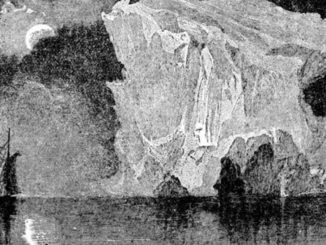September 19th, 1808, Lisbon.
We are in port at last, and I am glad to have my paws on the ground. It was a difficult passage out of the Channel, and we had to tack every few minutes till even the strong young bears were almost prostrate with exhaustion from handling the sails, but as soon as we passed Ushant and were able to turn south we made good headway. Even the notorious Bay of Biscay smiled on us, though I have known some gales there when all on board thought we were lost.
Lisbon is a fine city with many new buildings, having been almost entirely rebuilt after the calamitous earthquake of 53 years ago. But our motley band can find no home in the spacious streets created by the decrees of the Marqués de Pombal, and we are lodged in a smoky inn on the outskirts.
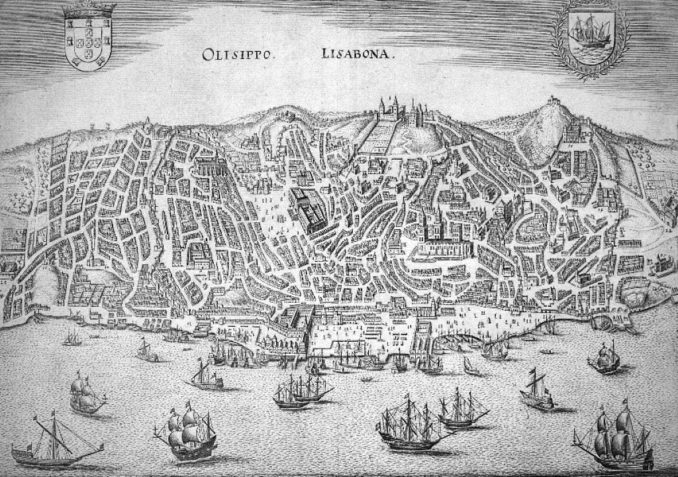
The day has not been without incident. No sooner had we settled in our rooms than we heard the roaring of a bear in pain in the street and, looking from the windows, saw her being sadly beaten with an iron bar by a villainous gypsy far gone in drink. Naturally we rushed to her aid, and when the miserable ruffian saw eight angry bears advancing on him, he fled precipitately.
The poor bear, bruised and bleeding, had fetters around her hind legs, and our first task was to carry her to a blacksmith to have them struck off. Fred has a few words of Spanish, and we are able to explain our needs after a fashion and be understood, but the Portuguese accent is so peculiar that we cannot understand a word that is said to us.
So now we are nine bears and two humans. She is called Angelina, and she is pathetically grateful to us for her rescue. She has promised to teach us some Portuguese dances, which will be of advantage to us in our travels.
It is strange how humans differ when they are drunk. Fred and Jem become jovial and expansive, as we bears do, but in some people strong drink releases a devil inside them. In the wise words of Alcaeus, οἶνος γὰρ ἀνθρώπω δίοπτρον, ‘For wine is a peephole into a person.’ (I cannot forbear to mention that he wrote in Aeolic dialect, and in standard Greek the genitive would be ἀνθρώπου.)
September 20th, 1808.
Although the invading army of the Corsican tyrant has been banished from Lisbon, the mood in the city remains uncertain. Not long before we arrived, Sir Arthur Wellesley defeated the French general Junot at Vimeiro.
Sadly, his gains have been undone by rascally politicians. Wellesley has been recalled, and the timid Sir Hew Dalrymple has negotiated (if that is the word, perhaps ‘surrendered’ would be more apt) the Convention of Cintra, under which Junot’s forces have been allowed to leave unmolested, under the aegis of the Royal Navy and bearing all their loot, to attack us another day. No one here, Portuguese or English, can see any sense in his behaviour, but I fear it is the way of our politicians to snatch defeat from the jaws of victory. The decision to abandon our attack was taken by Sir Harry Burrard. His men call him ‘Betty’ – need I say more? But I am sure that the able Wellesley will return to pursue his campaign.
October 1st, 1808.
Angelina has been teaching us the Portuguese dance known as the vira, which means ‘turn’. It is a lively affair requiring at last eight dancers, four male and four female, circling with front paws raised and sometimes linking with our partners and revolving together. Since we have an unequal balance of the sexes, dear Bruin has gallantly volunteered to perform as a girl, though he grumbles about the humiliation of having to twirl in a skirt. The male bears wear hats, which is apparently de rigueur in these parts. These do not fit a bear’s head and have to be secured by ribbons to keep them from falling off.
October 3rd, 1808.
None of us is accustomed to the strength of the local wines and our performances tend to be disorderly affairs. Last night we were dancing in an inn, and when we reached the point in the vira where the bears link paws and spin in pairs, on of them lost his grip on his partner and both departed in opposite directions into the audience. A table was overturned and a few people bruised, but the incident ended in laughter.
The people have been sadly crushed by the French invasion and we are taking almost no money, but the poorest folk are often the most generous and we are scraping a living, with the aid of rabbits and berries and wild honey and whatever we can gather. It is a far cry from performing for His Royal Highness The Prince Regent, but we are content and I for one am glad to be on the road again after our sojourn in the stinking fields of Kensington.
October 17th, 1808.
Sadly, the French have returned in force and the war has restarted in earnest. But the news is not all bad. Spanish forces stranded from an earlier campaign in Denmark have been rescued by the Royal Navy, and have arrived in Santander on the northern coast of Spain. British reinforcements under Sir David Baird arrived in Corunna – or, as the Spanish call it, A Coruña – a few days ago. The new British commander, General Sir John Moore, is marching north to meet them, and we shall go with him.
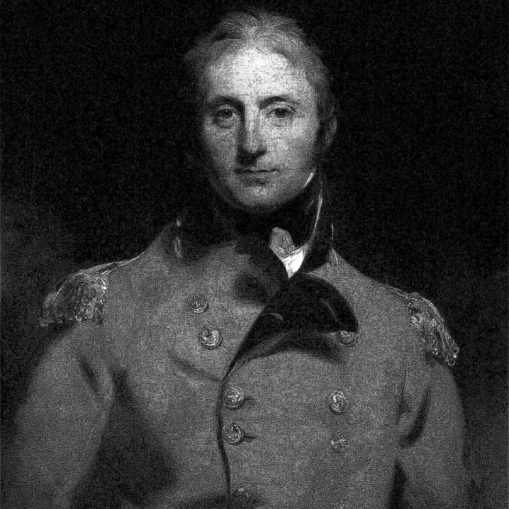
November 20th, 1808.
Fred has procured not one, but two of that wonderful new weapon the Baker rifle – I do not know how he came by them, and indeed would rather not know. Both he and Jem have been skilled poachers when necessity forced such an occupation on them, and they are delighted with the rifle’s accuracy. They can bring down a running rabbit at 200 yards, a feat out of the question with the muskets issued to the ordinary soldiers here. The rifle is rather slow to reload, as the ball has to be wrapped in greased leather and rammed down the barrel with considerable force. One would not wish to use it in a close infantry action, but for a sharpshooter in cover it is invaluable.
This evening at the inn where we were dancing, Jem spent several hours beside the fire with a pan of melted lead and some bullet moulds, casting balls for the rifles. I am no warrior, but I wish that the paws of bears were fitted to use such fine weapons.
However, Fred had also found us some cavalry sabres with basket hilts which we are able to grip effectively and with which, I am proud to say, we now exhibit some skill. We have been using the method recommended by Vegetius of practising our strokes by attacking wooden posts fixed in the ground. The posts did not last long when assailed by our powerful paws. Jem made a joke about citizens having a right to arm bears, a reference to the constitution of the new United States which no one else understood except myself, and we exchanged knowing glances while the others looked puzzled.
December 22nd, 1808.
We have been in a cavalry action – not, of course, mounted ourselves, but we are fleet of foot and can keep up with the horses except when they are charging at a full gallop. Yesterday at Sahagún a force of British Hussars under Lieutenant-General Henry, Lord Paget overwhelmed the French cavalry. Our enemy are no mean opponents but, as the battle hung in the balance, we rushed at them from one side brandishing our sabres and roaring terribly. This frightened the French horses so much that they all bolted. Our men pressed home their advantage and the enemy were completely routed.
Paget himself came to congratulate us, and said that we bears were worth a whole regiment to him. Our bosoms swelled with pride. I confess that I am acquiring a taste for war.
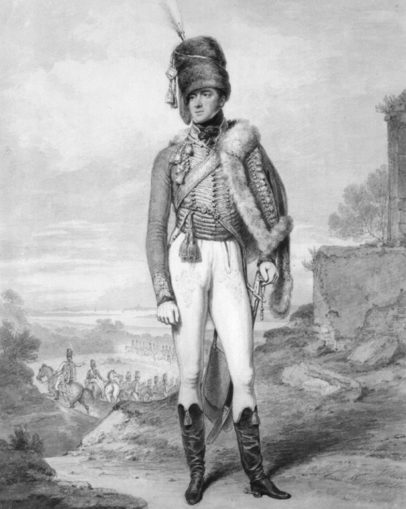
December 31st, 1808.
Bad news: the Spanish under the Marqués de la Romana were defeated by Soult yesterday at Mansilla. Our own men and bears remain undefeated, but we are now clearly on the retreat as we march to Corunna. We have managed to hold off the French in actions at Benavente and Cacabelos. At the second of these engagements, Thomas Plunkett of of the 95th Rifles shot the French General Auguste-François-Marie de Colbert-Chabanais dead at a range of almost 600 yards, and with his next shot wounded the general’s aide-de-camp, the even more grandly named Victor de Faÿ de Latour-Maubourg, as he tended his fallen superior. Fred and Jem are full of admiration for such marksmanship, which they can only hope to emulate.
January 17th, 1809.
Things are not going well for us. We have staged a fighting retreat to Corunna, but yesterday Sir John Moore was killed in the final battle. We were with the 15th Hussars on a hill outside the town, pelting the French with stones from a ruined house, when he was struck by a French cannonball. We carried him to safety, but he was mortally wounded and there was nothing we could do to save him. He remained conscious for several hours during which he saw the French successfully beaten off. We have just returned from a sad and silent burial party in the night.
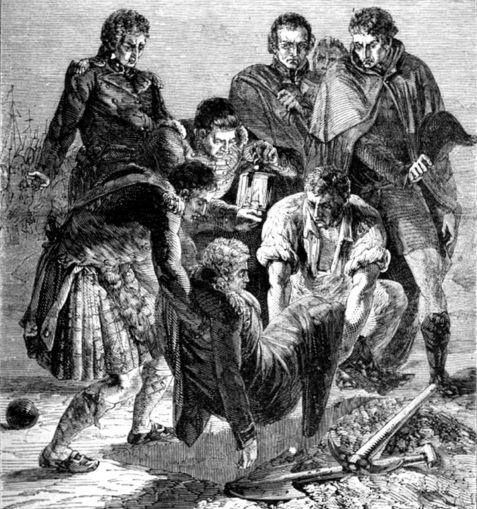
The British forces are surrounded but order still prevails, and our ever undefeated Royal Navy is at hand to bring them off. They cannot, however, take civilians or bears, however valuable these were in previous actions, and we are left on the shore.
The Spanish are understandably bitter, and there have been murmurings of betrayal – never mind that it was their own forces that crumbled first under the overwhelming French onslaught. Jem and Fred have done their best to reassure them that we have only staged a tactical retreat, and will return in greater force – as the damned French put it, reculer pour mieux sauter, stepping back to make a better leap. Nevertheless, we feel it advisable to creep away quietly and retrace our steps towards Portugal. Fred and Jem are now sunburnt, ragged, ruffianly looking, and fluent in kitchen Spanish and Portuguese, and no longer look like Englishmen – and a bear is a bear, and no one enquires about its nationality. We also retain our weapons, and quantities of powder and other supplies prudently rescued from the evacuation. It will be a hard journey, but we have seen worse.
Copyright © Tachybaptus 2019
The Goodnight Vienna Audio file
Audio Player

